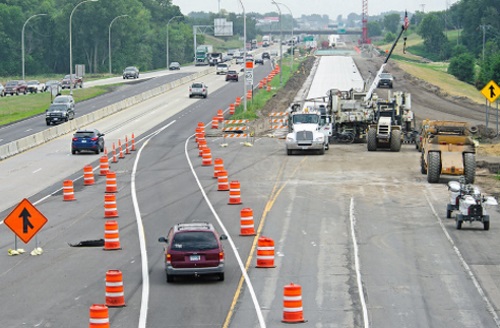This episode of the Environmental Technical Assistance Program or ETAP podcast focuses on the Minnesota Department of Transportation’s “Rethinking I-94 project.” The agency started that program in 2016 with the intent of reconnecting neighborhoods and revitalizing communities sundered by the original construction of Interstate 94 back in the 1960s. The program also seeks to ensure residents “have a meaningful voice” in transportation decisions that affect their lives today and into the future.
[Above photo of I-94 construction by the Minnesota DOT]
Margaret Anderson Kelliher – commissioner of the Minnesota DOT – and Gloria Jeff, director of the Rethinking I-94 project for the agency, discuss the long-term effort to improve the department’s engagement and relationships with communities along I-94 between the cities of Minneapolis and St. Paul.
“Environmental justice brings forward attention to the disproportionate outcomes for low-income and communities of color in the case of transportation,” said Kelliher. “It includes the burdens those communities have to face in terms of air and noise pollution from transportation. It is also a little broader in terms of race, geographies, and income disparities.”
That then draw in transportation equity, whereby the need for transportation systems need to “level up” and provide better mobility options to low-income and communities of color.
For example, Kelliher noted that a recent study found that a person living in the Minneapolis/St. Paul region who does not have access to a car or public transit has access to less than 10 percent of the jobs in that region. “That’s a major example of a transportation equity issue,” she said.
Minnesota DOT’s Jeff went on to explain that “transportation equity” issues is not a “quality,” not the idea that everybody gets “everything in the same way.”
It isn’t, “do I have a transit route operate near my home,” said Jeff but rather, “does it operate at the time that I need.” Jeff added that transportation equity is more than race and ethnic background, but that “this is where the current challenges exist” and why the current equity focus is on those two areas. To listen to the full podcast, click here.



